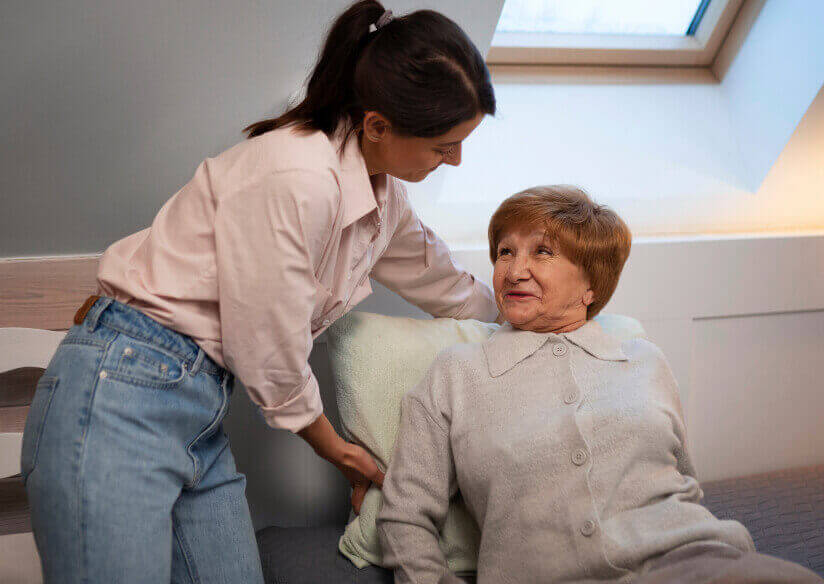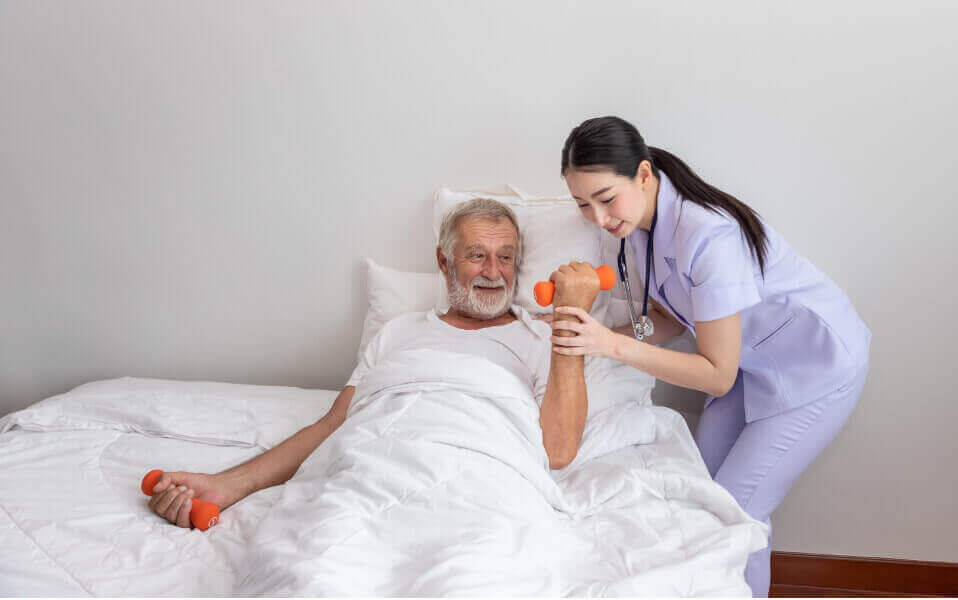
What is Overnight Senior Care?
Sometimes, the night can be tough for an elderly family member. Maybe your loved one struggles to get out of bed safely to use the bathroom, or perhaps they wake up feeling disoriented. You might even be worried they’ll forget to take their medications or have a fall when no one’s around to help. These situations can be stressful, and it’s natural to feel uneasy knowing your loved one is alone during the night. It’s hard to get a good night’s sleep when you’re constantly thinking, “What if something happens?”
With overnight caregiving, a professional caregiver stays with your loved one throughout the night, providing assistance whenever needed — whether it’s a trip to the bathroom, taking their medication on time, or simply having someone close by to offer comfort and assistance. It’s about making sure they feel safe and cared for while giving you peace of mind, knowing they’re in good hands, even when you can’t be there.
Overview of Overnight Home Care
Signs Your Loved One Needs Overnight Care
- Feel anxious or lonely at nighttime
- Struggle with restlessness or trouble sleeping
- Have difficulty getting in and out of bed or using the bathroom
- At risk of falling or injury moving around the home
- Need help with nighttime medications or personal care
- Experience chronic pain or conditions that require attention at night
- Recovering from surgery or illness and need overnight care
- Wake up confused or disoriented due to dementia or Alzheimer’s
- Family caregivers need a break
What's Included in Overnight Care

Nighttime Assistance
- Bathroom visits
- Repositioning in bed
- Incontinence care
Personal Care
- Evening hygiene routines
- Getting in and out of bed
- Moving around the house
Health and Safety
- Medication management
- Fall and wandering prevention
- Continuous monitoring
Companionship
- Engaging in conversations
- Comfort and reassurance
- Emotional well-being
Morning Routine
- Morning hygiene assistance
- Bathing, dressing and grooming
- Starting daily routine
Meal Preparation
- Meal planning
- Nutritious meals and snacks
- Breakfast preparation

How Overnight Elderly Care Works
Evening Routine
The overnight caregiver helps your loved one prepare for bed by assisting with personal hygiene, such as brushing teeth, changing into pajamas, and administering medications if needed. This ensures the senior is comfortable and ready to rest for the night.
Nighttime Support
Throughout the night, the caregiver remains alert and available to provide assistance whenever needed. This includes helping with bathroom visits, adjusting positions in bed, or offering companionship if your loved one wakes up disoriented or feels anxious.
Monitoring and Safety
The caregiver continuously monitors the senior, preventing accidents like falls and addressing any health concerns that may arise. Their presence ensures your loved one is safe and well cared for through the night.
Morning Assistance
In the morning, caregivers often help seniors with their morning routines, including bathing, dressing, and meal preparation. This ensures your loved one starts the day well cared for, without any interruptions in their routine.
Benefits of Overnight Home Care for Seniors
Familiar sights and routines can significantly reduce anxiety and confusion, especially for older adults with cognitive impairments like dementia. This sense of security often improves their emotional well-being and helps maintain a sense of independence.
In contrast to care facilities where staff tend to multiple patients, in-home care ensures the elderly receive dedicated attention. The caregiver is solely focused on their needs, whether it’s help with moving, medication reminders, or offering companionship.
The presence of a trained caregiver significantly reduces the risk of falls or other accidents during the night. Whether it’s assistance with getting in and out of bed or safely navigating dark hallways, having help close by ensures that your loved one is protected from potential injuries.
For those managing chronic conditions or recovering from surgery, having overnight care at home can help catch early signs of discomfort or complications. By identifying these issues early, families can take action to prevent the issues from escalating into more severe problems.
Seniors often sleep more soundly when they feel secure, knowing someone is there to assist them if needed. A caregiver’s presence can alleviate nighttime restlessness or anxiety, leading to better sleep quality and positively impacting overall health and mood during the day.
Knowing a professional is there during the night helps ease the concerns of family caregivers. Whether responding to health needs or providing emotional support, the caregiver ensures your loved one is never alone, allowing family members to rest without constant worry.
Cost of Overnight Home Care in Beaverton, OR
The cost of in-home overnight care in Beaverton, OR, varies depending on factors like location, the level of care required, and any specialized services. For example, basic companion care is often more affordable, while more intensive support, such as dementia care or assistance with chronic medical conditions, may cost more.
We understand that navigating care costs can feel overwhelming. That’s why our Beaverton team offers a complimentary care evaluation to assess your loved one’s unique needs and circumstances. This no-obligation consultation provides accurate cost estimates and helps you explore payment options, including veterans benefits or insurance coverage, if applicable.
Schedule an appointment with an Beaverton Aging Coach to gain clarity and create a care plan tailored to your family’s needs and budget.
Why Home Matters Caregiving
Personalized, holistic,
and compassionate care
Dedicated Aging Coaches
Our team of Aging Experts listen to you, understand your family’s needs, and guide you every step of the way.
Personalized Care Plans
A dedicated Aging Coach works with you to craft a care plan that caters to your family’s unique needs.
Continuous Monitoring
Your Aging Coach regularly reviews continued satisfaction surveys to make any necessary adjustments to your care plan.
Nurse-Guided Care
Our clinical team provides the foundation for quality care, allowing us to serve all clients, including those with complex needs.
Better Training, Better Care
Our caregivers undergo thorough screening and are continuously trained to ensure they provide the highest level of care.
Care on Your Schedule
Your needs may change with time. We offer flexible scheduling to accommodate your evolving preferences.
Getting Started with Overnight Care in Beaverton, OR
1. Initial Consultation
The first step is a free, no-obligation consultation where we discuss your loved one’s specific needs, lifestyle, and preferences.
2. Personalized Care Plan
Based on the consultation, our team will develop a personalized care plan that covers all aspects of your loved one’s needs.
3. Caregiver Matching
We carefully select and match a trained, compassionate caregiver who best fits your loved one’s needs and personality.
4. Start of Care
Once the plan and caregiver are confirmed, we will begin providing overnight care on your preferred schedule.
5. Ongoing Support and Adjustments
Your loved one’s needs may evolve over time, and we’ll regularly check in to make sure the care plan continues to meet their requirements.
Need care urgently?
Start care as early as today.
- Free, no-obligation consultation
“Home Matters has been a life saver!
So professional and always incredibly punctual. They gave me my independence back and have helped me stay active with my great grandchildren.”
Frequently Asked Questions
How does Overnight Care differ from 24-Hour Care and Live-In Care?
Overnight care involves a caregiver staying awake at night to assist with specific needs like bathroom visits, medication reminders, or emergencies. This type of care typically covers an 8 to 12-hour shift during nighttime hours, ensuring seniors are safe and supported while they sleep.
In contrast, 24-hour home care provides continuous, round-the-clock care with multiple caregivers rotating shifts to ensure complete coverage of everyday tasks without breaks. This is ideal for seniors who need constant 24/7 monitoring.
Live-In home care involves a caregiver residing in the home for an extended period, typically requiring breaks and sleep at night. While the caregiver is available most of the time, they may not be awake and on-call all night, unlike in overnight care.
Is there a minimum commitment for overnight care services?
How long does typical overnight care last?
Is overnight care available on weekends and holidays?
What happens if my regular caregiver is unavailable?
Can overnight caregivers sleep?
Are your caregivers trained and certified?
Are your caregivers background-checked and insured?
Can I customize my care plan to meet specific needs?
How to get overnight care for the elderly?
Real Reviews.

